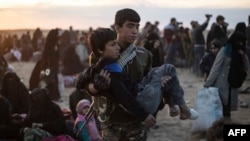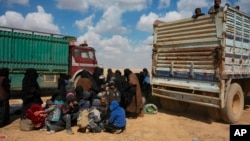At staging areas on the outskirts of the northeast Syrian village of Baghuz, the exodus before the end looked more like an exodus without end.
Women and girls clad in burkas, along with small children, marching, shuffling, slowly but surely, joining thousands of others in abandoning the last shred of the Islamic State terror group’s self-declared caliphate.
The scene played out on the ground and again on social media Wednesday, as officials with the U.S.-backed Syrian Democratic Forces explained that another 2,000 people had chosen to leave Baghuz.
About 400 IS fighters also surrendered, the SDF said, after a failed attempt to use smugglers to get them to safety.
“We left the siege and the people that you call Daesh (Islamic State),” one woman told a cameraman for the Reuters news agency.
“But what you don’t know is what’s inside the hearts of Daesh. The kindest people are there,” she added.
Not all who left Baghuz are so sentimental. SDF spokesman Mustafa Bali said among those escaping Wednesday were 12 boys, some of them Yazidis, who had been kidnapped by IS.
Four of them said they had been taken from Tal Afar, in Iraq. On Twitter, Bali made a plea for anyone who could to help them return to their homes.
Staggering number of civilians
Overall, the numbers of civilians and fighters fleeing from the small patch of land have been staggering.
Just two weeks ago, SDF officials estimated there were 1,000 people still holed up in IS-controlled Baghuz. Since then, based on estimates from the United Nations and SDF, as many as 24,000 have fled.
In the past three days alone, coinciding with the SDF’s decision to pause offensive operations, about 8,000 civilians have come out, along with at least 900 IS fighters.
However, it is not just SDF officials, who launched the final assault only after declaring that all civilians had been evacuated, who have been caught off guard.
“We have been surprised by just how many people have come out,” a U.S. defense official told VOA on condition of anonymity, noting the evacuations may go on for some time.
Regarding efforts to put an end to the IS caliphate, the official said: “It is what it was a week ago. It really hasn’t progressed.”
IS operates underground
Efforts to get a better sense of just how many people remain in Baghuz have been difficult. Officials say there has been little movement above ground, where Islamic State is holding onto an area covered by wrecked buildings and scattered tents.
But officials advise that Baghuz’s multiple valleys make it a deceptively large area. And underground, hidden from the view of reconnaissance drones and other aircraft, IS has used what’s been described as a complex network of tunnels and caves, extending possibly for more than 2 kilometers.
Coalition and SDF officials believe it is there, surrounded by explosives and booby traps, where hundreds of the most devoted and hardened IS fighters still lurk.
Officials believe that like many of the more recent evacuees, many of the fighters are from Central Asian countries and, seeing little hope of escaping prosecution or of returning home, are ready to make one last stand.
Terror group’s resolve unbroken
For now, according to officials, efforts to bring out more IS fighters and civilians, and to negotiate the release of any remaining prisoners and hostages, will continue until only those committed to fighting and dying remain.
Still, they do not expect the liberation of Baghuz and the end of IS’ self-declared caliphate will break the terror group’s resolve.
IS’ key leaders and officials, if they were ever in Baghuz, are thought to have fled long ago, officials said, joining thousands of IS fighters and followers already engaged in a relentless insurgency across Syria and Iraq.
Information from Reuters was used in this report.







